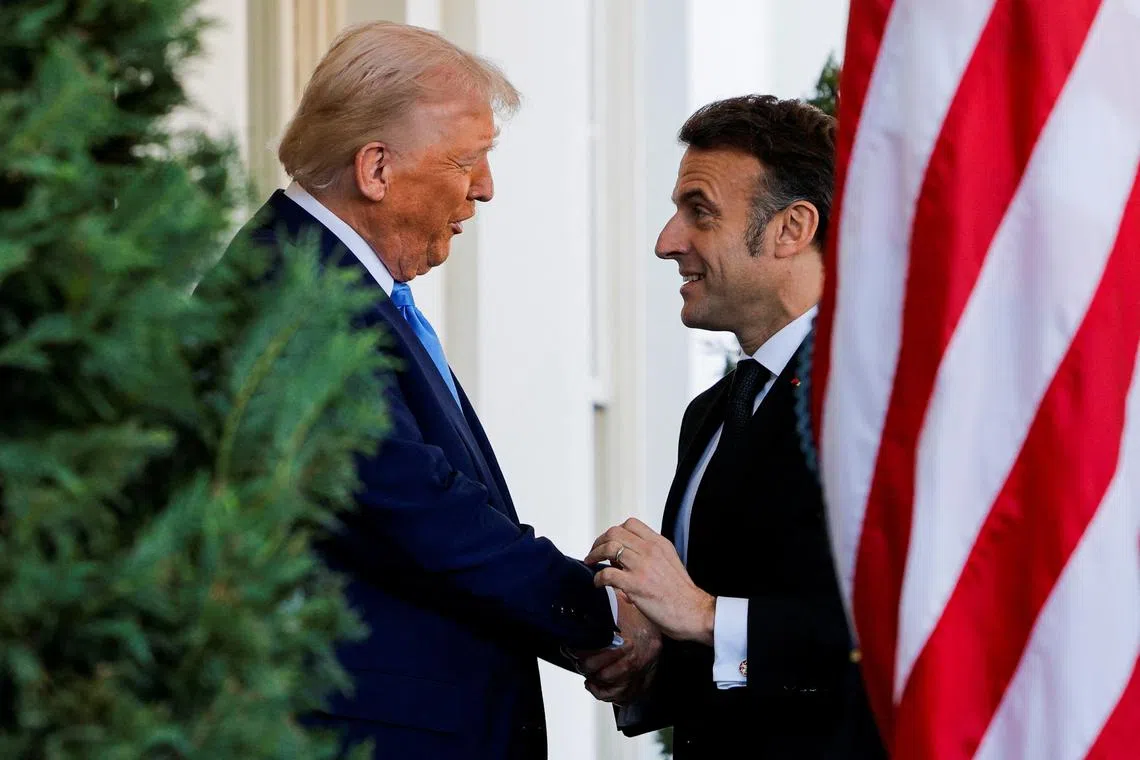Macron warns Ukraine peace can’t mean ‘surrender’, after Trump talks
Sign up now: Get ST's newsletters delivered to your inbox

US President Donald Trump shaking hands with French President Emmanuel Macron at the White House on Feb 24.
PHOTO: REUTERS
WASHINGTON - French President Emmanuel Macron warned on Feb 24 that peace cannot mean the “surrender” of Ukraine, but said talks with US President Donald Trump had shown a path forward despite fears of a transatlantic rift.
Meeting at the White House on the third anniversary of Russia’s invasion, the two leaders said there was progress on the idea of sending peacekeepers to Ukraine, although Mr Macron insisted on US security guarantees for Kyiv.
Their talks came as Ukrainian President Volodymyr Zelensky called for peace “this year” as he met European leaders in Kyiv – amid mounting fears that Mr Trump is pivoting towards Russia’s stance.
Early on Feb 25, air raid sirens sounded across Ukraine as the authorities warned of a wide missile attack. They later reported at least five people were wounded, and multiple buildings were damaged.
The authorities in neighbouring Poland said they scrambled military aircraft in response to the missile attack.
At the UN, the US sided with Russia twice on Feb 24, as Washington sought to avoid any condemnation of Moscow’s invasion of its pro-Western neighbour
“This peace cannot mean the surrender of Ukraine,” Mr Macron told a joint news conference with Mr Trump.
Mr Macron said Mr Trump had “good reason” to re-engage Russian President Vladimir Putin, but said it was critical for Washington to offer “backup” for any European peacekeeping force.
The French President said he would work with British Prime Minister Keir Starmer, who will visit the White House on Feb 27, on a proposal to send peacekeeping troops to Ukraine in the event of a deal.
“After speaking with President Trump, I fully believe there is a path forward,” said Mr Macron.
‘End it within weeks’
The French President rushed to Washington after Mr Trump sent shock waves around the world
Mr Trump’s recent embrace of Russia has sparked fears not only that it could spell the end of US support for Kyiv, but for the rest of Europe too.
The US President said on Feb 24 that he was confident of bringing an end to the war, and that he expected Mr Zelensky at the White House in the next two weeks to sign a deal granting Washington access to Ukraine’s rare minerals
“I think we could end it within weeks – if we are smart. If we are not smart, it will keep going,” Mr Trump said earlier in the Oval Office alongside Mr Macron.
Mr Macron later agreed that a truce was possible in “weeks”, in an interview with Fox News’ Bret Baier.
Mr Trump, meanwhile, added that Mr Putin was ready to “accept” European troops deployed in Ukraine as guarantors of a deal to end fighting.
But billionaire tycoon Trump repeated his demands that Europe bears the burden for future support of Ukraine, and that the US recoups the billions of dollars in aid it has given Kyiv.
He also declined to call Mr Putin a dictator – despite doing so to Mr Zelensky last week
For his part, Mr Putin has been biding his time since his ice-breaking call with Mr Trump less than two weeks ago.
Mr Putin said in an interview with state television on Feb 24 that European countries can participate in talks to resolve the conflict in Ukraine, his first sign of flexibility on the issue.
‘Decisive break’
Sanctions-hit Moscow is meanwhile also eyeing the economic side, just as Mr Trump is.
Mr Putin said on Feb 24 that US and Russian companies were “in touch” on joint economic projects – including strategic minerals in occupied Ukraine
Mr Putin added in his interview with state television that Mr Zelensky was becoming a “toxic figure” in Ukraine – in comments that have again been echoed by Mr Trump.
Mr Trump and Mr Putin are eyeing a possible meeting in coming weeks in Saudi Arabia.
Mr Zelensky, who has said he would step down in exchange for peace with a guarantee that Ukraine could join Nato, called on Feb 24 for a “real, lasting peace” in 2025.
Mr Putin’s decision to launch the invasion
Mr Trump has, however, accused Ukraine of starting the war, as he rapidly moves to abandon Democratic predecessor Joe Biden’s support for Kyiv.
The Republican spelled things out on Feb 24, saying he was making a “decisive break” with traditional US foreign policy, which he called “very foolish”.
In a sign of Washington’s pivot, the US sided with Moscow and North Korea as it pushed its own language in a vote in the UN General Assembly that declined to blame Russia for the war.
The US then hailed a “landmark agreement” with Russia after the UN Security Council later adopted a US resolution that also contained no criticism of Moscow’s aggression. AFP


